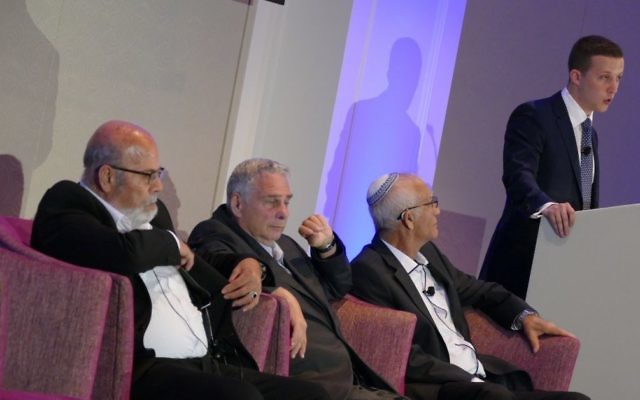FIDF, Paratroopers Celebrate Wall’s Liberation
The trio from the iconic 1967 photo helps Atlanta mark the 50th anniversary.

Eli Regev was one bullet from death during the battle for Jerusalem in the Six-Day War, seeing both soldiers next to him shot down and knowing he was next, only to be spared when the Jordanians ran out of ammunition.
So he was ready when he and fellow Israeli paratroopers were ordered to “run like lions into Jerusalem” despite carrying 110-pound packs on their backs, and when the city was reunited, he leaned against the Western Wall as he wrote a letter home to his wife and 4-month-old daughter.
That infant’s grown daughter, Israel Defense Forces Sgt. Emma Browne, told her grandfather’s story during the Friends of the IDF’s celebration of Israel’s victory 50 years ago.
The event Monday night, June 12, drew a sold-out crowd of 250 people to The Temple to meet the three paratroopers from David Rubinger’s iconic photo taken moments after the IDF’s liberation of the Temple Mount and the wall below: Zion Karasanti, Yitzhak Yifat and Haim Oshri.
That photo, in which the soldiers gaze upward beside the wall, was not posed, the trio said. Yifat said he had his helmet off, unlike Karasanti and Oshri, because he was excited and emotional and because it was hot.

“Brick by brick, that wall represents everything we are as Jews,” said Garry Sobel, who chairs FIDF Southeast and serves on the national board. “It’s our wall.”
With the help of Georgia Tech grad and former lone soldier Eran Mordel as moderator and translator, the three soldiers recounted their experiences of 50 years ago, starting with the mobilization a couple of weeks before the fighting.
Yifat, an OB/GYN, said that not only didn’t the Israeli paratroopers have a plan for capturing Jerusalem, but they actually started out June 7 on a mission to break the blockade on the Straits of Tiran. The troops were diverted to Jerusalem after Jordan began a bombardment of the city, he said.
“We’re not going to fight in Jerusalem,” Karasanti, a director and choreographer, said the troops were told. “We’re going to win in Jerusalem.”
All three emphasized that they had no time to consider options or consequences; they had to fight to survive.
Oshri, a chemist, recalled that three generals, including Moshe Dayan and Yitzhak Rabin, arrived 15 minutes after the Temple Mount was secured, and Dayan put a note in the wall. The two other generals soon took the note down and read it. The translation: “Forever, forever, forever, we’re not going to return Jerusalem. We’re not going to return the Temple Mount. We’re not going to return the Western Wall from our hands.”
Browne’s grandfather didn’t live to see the 50th anniversary of Jerusalem’s reunification; he didn’t even make it to the first. He was killed by a Jordanian rocket June 4, 1968, while farming in northern Israel. But his example inspired Browne, who grew up in England, to serve in the IDF as a lone soldier, then stay in Israel.

She spoke at the 2016 FIDF Atlanta gala, when the keynote speaker, British Col. Richard Kemp, called her one of the most impressive soldiers he has known.
FIDF supports 2,800 lone soldiers like Browne each year at a cost of more than $4 million. The organization also helps 14,400 soldiers a year with educational expenses, 8,000 with financial support and 30,000 through its adopt-a-brigade program (FIDF in Atlanta has adopted the combat intelligence brigade).
FIDF also spends more than $16 million a year building recreational and other support facilities on IDF bases and helps more than 2,000 families of fallen and wounded soldiers.
Seth Baron, the executive director of FIDF Southeast, said he normally ends programs by thanking the organization’s supporters, and he did that Monday night.
But after an “absolutely amazing,” historic program, he also made a point of thanking the three paratroopers and everyone else in the room who serves or previously served in the IDF to help keep “Jerusalem united, Israel safe and secure, so that I, my children, your families and your children and grandchildren can go to the Kotel, can visit the religious sites throughout the state of Israel.”



comments